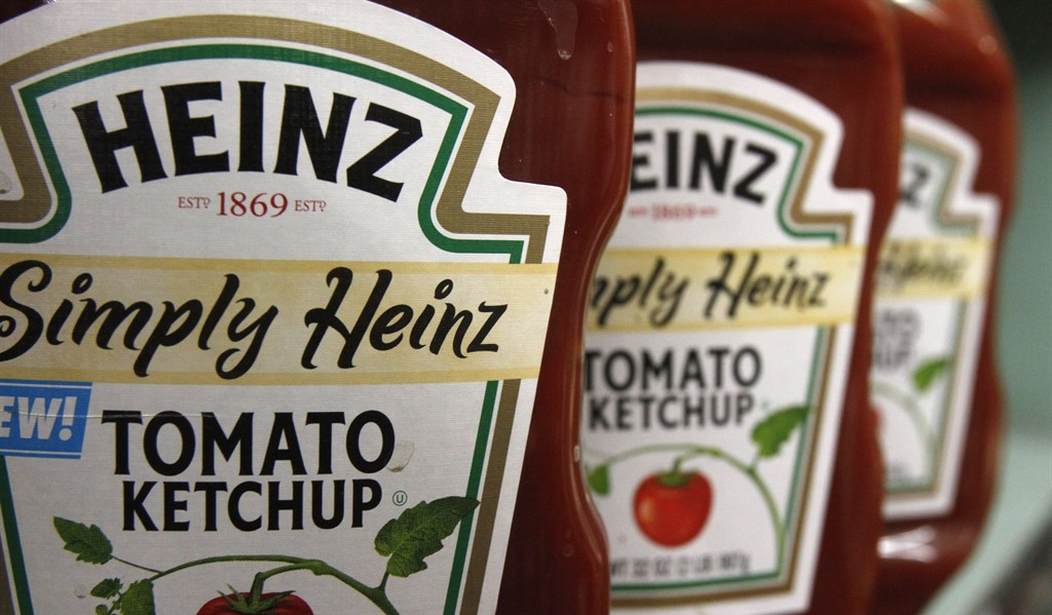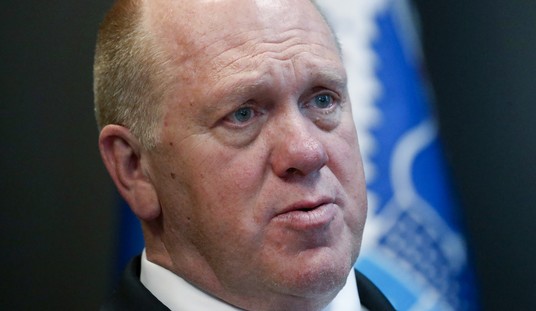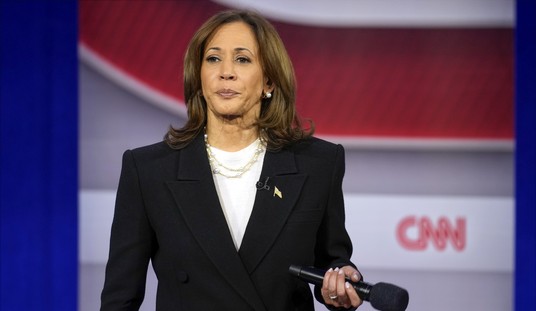Ketchup is now cancelled.
Black Lives Matter activists are accusing Heinz of publishing a pair of "racist" ads: one apparently omitting the appearance of a black dad character — supposedly an insinuation that the condiment company believes most black households are fatherless — and the other allegedly reminiscent of Jim Crow-era minstrel shows.
The first controversial commercial, part of the U.S. food manufacturer's campaign called "Family Portraits," celebrates an interracial couple on their wedding day. Specifically, the graphic shows a black bride indulging in Heinz's new family-sized pasta sauce at her reception while relatives look on in amusement. Seated to her left appears to be her newly wedded husband, who's white, and an older black woman meant to be her mother. On the other side are the groom's parents, presumably. Apparently absent is the bride's father, not pictured.
Racial justice warriors took to social media to rage-tweet about the advertisement, with some saying it embodies the "erasure" of black fathers in mainstream media. Another called it "subliminal messaging," a means of "perpetuating myths" about black absentee fathers. Leading the pitchfork army is Guardian contributor Nels Abbey, author of "Think Like a White Man: A Satirical Guide to Conquering the World . . . While Black."
Recommended
However, one wrote: "Wouldn't traditional wedding seating mean the bride's father sits next to the groom's mother. Meaning the man on the left is the bride's father and the groom's father is missing?" Another agreed: "Seating arrangement for a top table at a wedding is the bride's father and the groom's mother next to the bride. The groom's father and bride's mother are next to the groom. It's the groom's father that is missing."
Others, chalking it up to limited space on the advertising board, reasoned that the graphic's designers must have wanted the bride, who had dripped some of the spaghetti onto her white dress, to be featured in the middle, and to achieve symmetry, a parent had to be left out. Notably, every single ad in Heinz's series has only five people in the picture.
Perhaps the giveaway is what's written in the bottom right-hand corner of the ad: "Based on a true story."
According to Marketing Beat, the ad campaign portrays real-life stories of consumers willing to defy conventions because of their passion for the product — for instance, a carefree bride who isn't concerned about spilling sauce. The rule breakers also include a rebellious nun digging in during the saying of Grace and a mischievous grandma feeding herself first before her grandkids.
Heinz has since issued a public apology over the billboard, which appeared in at least two of London's Tube stations during the U.K.'s Black History Month in October.
"We understand how this ad could have unintentionally perpetuated negative stereotypes. We extend our deepest apologies and will continue to listen, learn, and improve to avoid this happening again in the future," Heinz said in a statement to The Independent.
Reacting to the story, a letter addressed to the editor at The Guardian said it wouldn't have "been right for Heinz to add a black dad in for optics' sake."
"I also don't think the absence of a black dad is reason for Heinz to disregard the story," wrote a black woman whose father wasn't present in her life, saying "an absent father for me, and for many others (not just black people) is a reality. We shouldn't hide that." More insight from The Guardian reader:
Black people are beholden to respectability politics. We must be presented in a way that shows the assumed best versions of our community. In this case, it's as if we should ignore the reality of absent fathers, but they do exist – why should we lie about it? I am who I am because of my single mother, and if it were me behind the story, I would have rejected the idea of adding a dad to the scene to avoid negative stereotypes, because then the story is simply not true.
[...]
But ultimately, as this ad is based on a true story, it has as much right as any to exist.
The second advert in question depicts a black man holding a hamburger with Heinz ketchup smeared around his mouth.
Ahead of Halloween, it ran as part of Heinz's latest European ketchup campaign called "Smiles," which was launched as a nod to the new "Joker" movie, according to AdAge. The series features other actors, who are white, grinning ear to ear and similarly styled with their lips lined with ketchup. The ads are taglined, "It ha ha has to be Heinz," evidently a reference to the "Joker" sequel, "Folie à Deux," meaning "shared madness."
Critics claimed it "bears resemblance to historical[ly] racist caricatures," carries "blackface connotations," and contains imagery invoking 19th-century minstrel shows, in which white actors portrayed black people as dimwitted and buffoonish, often donning clownish features, such as enlarged red lips.
Heinz (@HeinzTweets) is currently under fire for their latest ad campaign. Many are calling out the cultural insensitivity behind the imagery, underscoring the urgent need for better representation at the decision-making level. pic.twitter.com/uPsjcixdmI
— Revamped | Career & Workplace Development (@RevampedCP) October 10, 2024
Heinz also apologized for the "racially insensitive" ad and pledged to pull the poster "immediately."
"As a consumer-obsessed company, we are actively listening and learning, and sincerely apologize for any offense caused by our recent 'Smiles' campaign," a Kraft Heinz spokesman told AdAge. "Although it was intended to resonate with a current pop culture moment, we recognize that this does not excuse the hurt it may have caused. We will do better. We are working to remove the advertisement immediately."
DEI marketing experts suggested Heinz should hire a "culturally sensitive" semiotician who specializes in the study of signs and symbols and what they mean in a historical context.
"To succeed in a diverse world – brands must do more than just create – they must understand, respect and reflect the cultural complexities of the audiences they aim to reach," Hai by RWS head of marketing Krissie Petfield remarked. "Anything less, risks not just a failed campaign or a fractured reputation, but ultimately shows a lack of respect for others."
"The incident with the Halloween ad highlights a critical lesson for marketers: visuals are not neutral; they carry significant cultural meanings. What may seem playful or harmless in one context can easily evoke harmful stereotypes in another."
























Join the conversation as a VIP Member